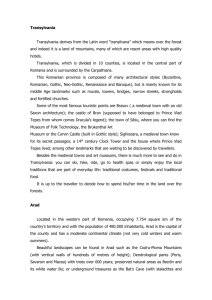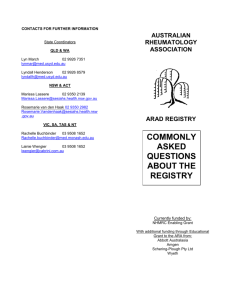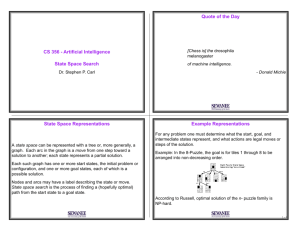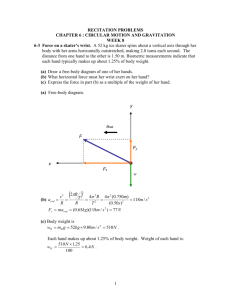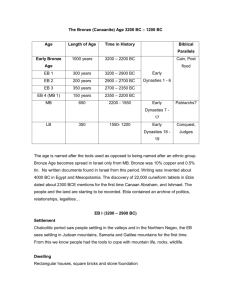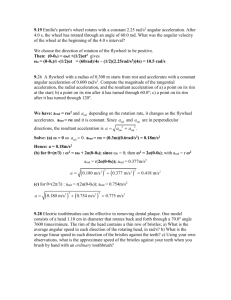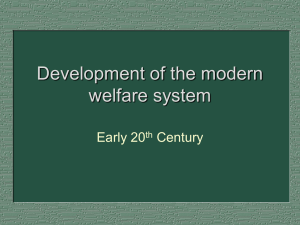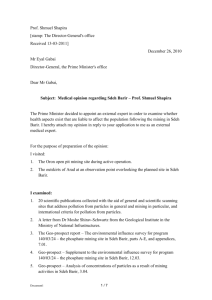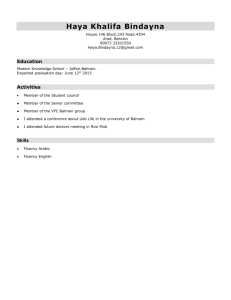- Animed Arad
advertisement
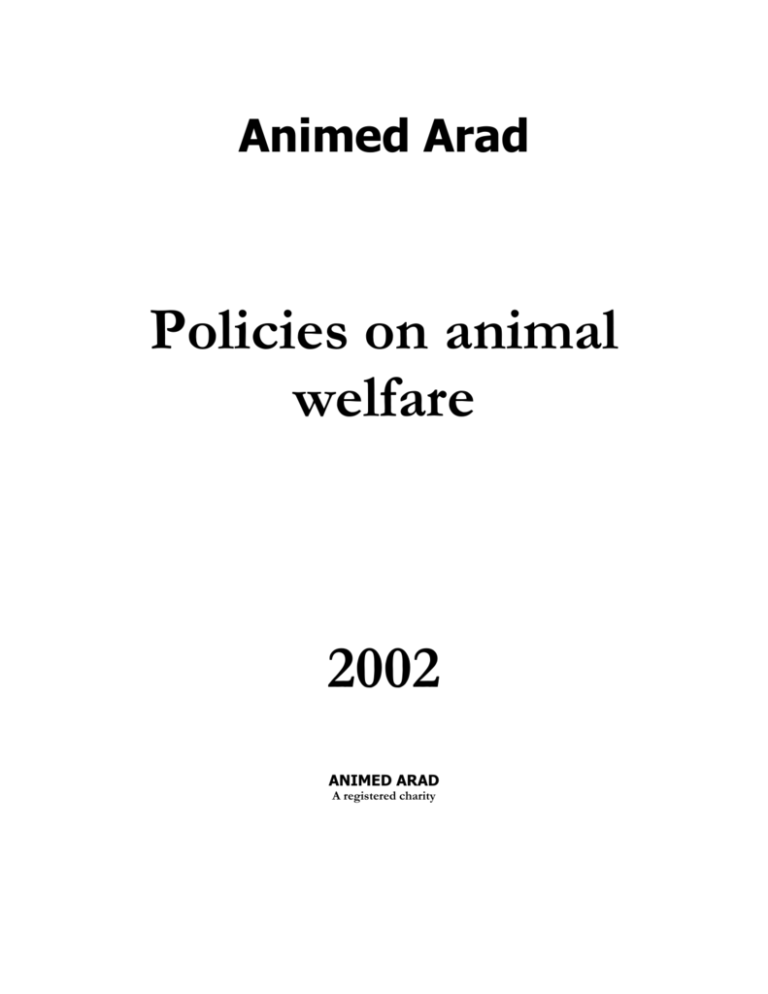
Animed Arad Policies on animal welfare 2002 ANIMED ARAD A registered charity ANIMED ARAD Policies on animal welfare Contents Contents ...........................................................................................................................................2 Animed Arad and its work ..............................................................................................................4 Introduction.....................................................................................................................................5 Objects of the organisation ....................................................................................................................5 Mission statement...............................................................................................................................5 The organisation’s vision ......................................................................................................................5 General principles...............................................................................................................................5 The organisation’s policies ....................................................................................................................6 1. Companion animals ....................................................................................................................7 1.1 Responsible ownership....................................................................................................................7 1.2 Acquiring an animal .....................................................................................................................7 1.3. Population control ........................................................................................................................7 1.4 Dog registration............................................................................................................................8 1.5. Dog wardens ...............................................................................................................................8 1.6 Surgical mutilations ......................................................................................................................8 1.7 Quarantine .................................................................................................................................8 1.8 Euthanasia .................................................................................................................................9 1.9 Use of animal organs for transplantation into animals ..........................................................................9 2. Horses and donkeys ..................................................................................................................10 2.1 Tethering of equines.....................................................................................................................10 2.2 Racing......................................................................................................................................10 2.3 Show jumping, eventing and dressage...............................................................................................10 2.4 Donkey derbies and other equine rides.............................................................................................10 3. Food animals .............................................................................................................................11 3.1 General considerations .................................................................................................................11 3.2 Food labelling ............................................................................................................................12 3.3 Poultry .....................................................................................................................................12 3.4 Calves ......................................................................................................................................12 3.5 Livestock markets ......................................................................................................................13 3.6 Pigs .........................................................................................................................................13 3.7 Production systems ......................................................................................................................13 3.8 Transportation ...........................................................................................................................14 3.9 Slaughter ..................................................................................................................................15 3.10 Casualty animals ......................................................................................................................15 4. Laboratory animals ...................................................................................................................16 4.1 Pain and suffering in experiments ..................................................................................................16 4.2 Unnecessary experiments ..............................................................................................................16 4.3 Alternatives...............................................................................................................................16 4.4 Legislative and ethical concerns ......................................................................................................16 4.5 Laboratory animal supply ............................................................................................................17 5. Animals in the wild ...................................................................................................................18 5.1 General considerations .................................................................................................................18 2 ANIMED ARAD Policies on animal welfare 5.2 Snares and traps ........................................................................................................................18 5.3 Poisons .....................................................................................................................................18 5.4 Feral cats ..................................................................................................................................18 5.5 Conservation..............................................................................................................................19 5.6 Trade in wild animals .................................................................................................................19 5.7 Whales and seals ........................................................................................................................19 6. Animals in entertainment, sport and fashion ..........................................................................20 6.1 General considerations .................................................................................................................20 6.2 Captive animals including those in zoos ...........................................................................................20 6.3 Performing animals .....................................................................................................................20 6.4 Rodeos .....................................................................................................................................20 6.5 Dog racing ................................................................................................................................21 6.6 Falconry ...................................................................................................................................21 6.7 Bullfighting ...............................................................................................................................21 6.8 The giving of live animals as prizes .................................................................................................21 6.9 Fur..........................................................................................................................................22 6.10 Hunting .................................................................................................................................22 6.11 Shooting..................................................................................................................................22 6.12 Angling ..................................................................................................................................22 7. Animals and education .............................................................................................................23 7.1 General considerations .................................................................................................................23 7.2 Animals in schools and colleges. .....................................................................................................23 7.3 Educational visits .......................................................................................................................23 7.4 Visiting animals and temporary loan schemes ...................................................................................24 7.5 Dissection .................................................................................................................................24 7.6 Behavioural experiments ..............................................................................................................24 7.7 Technology.................................................................................................................................24 7.8 School and college farms and animal collections .................................................................................25 7.9 Vocational education ...................................................................................................................25 7.10 Higher education ......................................................................................................................25 8. Miscellaneous ............................................................................................................................26 8.1 Transport of unaccompanied animals ..............................................................................................26 8.2 Genetic engineering ......................................................................................................................26 8.3 Patenting ..................................................................................................................................26 3 ANIMED ARAD Policies on animal welfare Animed Arad and its work Animed Arad is a local animal welfare organisation from Arad, Romania. It was established in September 2001 and it is a charity supported entirely by voluntary donations. The organisation’s purpose as given in its statute is to promote the humane treatment of and to prevent or suppress cruelty to animals. The organisation intends to care for all animals in all circumstances. Animed Arad has no paid staff. Its volunteers work round the clock to help animals in distress. A major part of the volunteers’ work is to place unwanted animals into new and caring homes as well as taking care of their injuries and illness. Animed Arad is working to implement the European and the international animal welfare standards in Arad through its policies, and, in the future, by campaigning for specific animal welfare legislation. That is why the organisation’s policies on animal welfare as well as the rehoming policies and rules are in fact a translation (with little or no modifications) of the RSPCA’s. Animed Arad has copied these policies because it intends to implement them locally and, in time, in all of Romania. These policies represent Animed Arad’s position on particular issues, as well. However, readers should be aware of the lack of animal welfare legislation in Romania. Animed Arad has no power or authority to take away someone’s animal because it is treated improperly. The organisation can only request that the owners give the animal in our care or let us buy it. In most cases, the cruelly treated animals are being taken off the streets. They receive medical care, and if they are strong enough and survive, they are rehomed or they live out their lives at our shelter. Because of the lack of animal welfare legislation and because Animed Arad is still a small organisation and does not have the power to enforce such missing legislation at the moment, its volunteers work directly with people, especially with the young, to educate them towards animal care and welfare. If there is no law to force us to be kind to animals, we should do that from the goodness of our hearts or thanks to our education! 4 ANIMED ARAD Policies on animal welfare Introduction Objects of the organisation The charitable objects of Animed Arad are to promote kindness and to prevent or suppress cruelty to animals and to do all such lawful acts as the organisation may consider to be conductive or incidental to the attainment of those objectives. (as written in the Animed Arad’s Statute 2001) Mission statement Animed Arad as a charity will, by all lawful means, prevent cruelty, promote kindness to and alleviate suffering of animals. Animed Arad intends to achieve its mission by: operating a strong and effective local organisation dedicated to providing a public service, delivering effective relief of animal suffering working tirelessly to reduce the harmful impact of human activities on animals through education and campaigning maintaining, as an organisation, the highest levels of efficiency and effectiveness. The organisation’s vision To work for a world in which all humans respect and live in harmony with members of the animal kingdom. General principles The general principle on which the organisation operates is based on the fact that vertebrates and some invertebrates feel pain and experience distress. The organisation 5 ANIMED ARAD Policies on animal welfare believes that, where there is doubt about whether or not animals are suffering, the benefit of the doubt should always be given to the animals. The organisation believes that it is important to protect the interests of individual animals and that the responsibility to ensure this lies with us, the human species. The organisation’s policies The organisation’s policies on animal welfare as well as the rehoming policies are implemented from the RSPCA. These policies set out Animed Arad’s views on the way in which animals are treated. They are intended to provide guidelines for further action and to encourage a more compassionate attitude towards animals generally. 6 ANIMED ARAD Policies on animal welfare 1. Companion animals 1.1 Responsible ownership 1.1.1 Animed Arad discourages the keeping of companion animals by those who do not have the facilities, time, financial means or interest necessary to ensure a satisfactory standard of care for, and long term commitment to their animals. 1.1.2 Animed Arad is opposed to any degree of confinement which is likely to cause distress or suffering to the animals concerned. 1.2 Acquiring an animal 1.2.1 Animed Arad advocates that all animals should be acquired by the prospective owner from the place where they were born or from the Animed Arad animal centre (or any other reputable rescue organisation). The display of animals in pet shops, pet supermarkets and garden centres can lead to impulse buying without proper regard for the responsibilities of animal ownership. Exotic animals such as snakes, lizards and terrapins are difficult to look after and will rarely be provided with adequate facilities. 1.3. Population control 1.3.1 Animed Arad advocates the neutering of domestic cats and dogs and other domestic animals as an important part of responsible ownership. 1.3.2 Animed Arad is opposed to the breeding of animals which produces changes in bodily form or function which are detrimental to their health or quality of life. 1.3.3 Animed Arad is opposed to the irresponsible breeding of puppies or kittens (i.e. puppy or kitten farms), other mammals and exotic animals in both private and commercial undertakings. 7 ANIMED ARAD Policies on animal welfare 1.3.4 Animed Arad believes that breeding establishments should be properly inspected and regulated and that permanent identification of animals should be undertaken by breeders. 1.4 Dog registration 1.4.1 Animed Arad is convinced that a properly financed and organized scheme to control unwanted and stray animals is part of government responsibility and should include provisions for the identification and registration of dogs nationally. 1.5. Dog wardens 1.5.1 Animed Arad welcomes the introduction of local authority dog warden schemes and encourages properly funded schemes for careful rehoming, neutering and microchipping of unclaimed stray dogs. 1.6 Surgical mutilations 1.6.1 Animed Arad is opposed to the mutilation of animals for cosmetic purposes. 1.7 Quarantine 1.7.1 Animed Arad accepts the principle of the controlled entry, without quarantine, of dogs and cats from these European Union and other countries that are recognized by the World Health Organization as being free from rabies in those species. Animed Arad believes that quarantine should remain for dogs and cats imported from countries which do not satisfy the criteria given above. 1.7.2 Animed Arad believes that all necessary steps should be taken to ensure that rabies is limited to the maximum extent possible in Romania. If implemented correctly, Animed Arad believes that a system comprising vaccination, certification of blood testing and permanent identification through microchipping will provide Romania with effective protection. 8 ANIMED ARAD Policies on animal welfare 1.8 Euthanasia 1.8.1 Animed Arad is opposed to the euthanasia of fit and healthy animals. Animed Arad will continue to strive for a future where putting down fit and healthy animals will be unnecessary. Where euthanasia is carried out it must be by trained operators using approved methods. 1.9 Use of animal organs for transplantation into animals 1.9.1 While Animed Arad accepts that organs may only be transplanted from animals which will die imminently from natural causes to appropriate recipient animals, with the explicit approval of both owners, and where there is a good chance of clinical success, Animed Arad itself will not carry out such procedures. 9 ANIMED ARAD Policies on animal welfare 2. Horses and donkeys 2.1 Tethering of equines 2.1.1 Animed Arad is opposed to tethering as a method of managing equines. 2.2 Racing 2.2.1 Animed Arad is opposed to training practices, racecourse conditions or facilities that result in injury. 2.2.2 Animed Arad is opposed to the use of drugs which are administered with a view to altering the performance of an animal including by masking pain. 2.2.3 Animed Arad is opposed to races where distress or injury follow the placing of unreasonable or excessive demands upon the horse. 2.2.4 Animed Arad is opposed to the use of whips which cause pain or suffering. 2.3 Show jumping, eventing and dressage 2.3.1 Animed Arad is opposed to practices which can cause suffering in show jumping, eventing or dressage. This includes striking with the whip so as to cause distress or suffering; competition where obstacles are unreasonably difficult; the use of training methods which cause distress or suffering, and the use of drugs to alter the performance of the horse or to enable it to compete. 2.4 Donkey derbies and other equine rides 2.4.1 Animed Arad disapproves of donkey derbies and inappropriate equine rides but, while they continue, will seek to ensure the welfare of the animals. 10 ANIMED ARAD Policies on animal welfare 3. Food animals 3.1 General considerations 3.1.1 Animed Arad is opposed to all forms of farming that cause distress or suffering, or deprive animals of the opportunity to indulge in their natural behaviour, and believes that farming practices should provide, as nearly as possible, natural lifestyles for the animals concerned. The welfare of an animal includes its physical and mental state and Animed Arad considers that good animal welfare implies both fitness and a sense of well-being. Animed Arad is concerned that the commercial mass production of food animals in the livestock industry causes suffering to a greater or lesser extent whether through the close confinement of some systems or through shortcomings in transport and slaughtering techniques. Animed Arad promotes the adoption of the Five Freedoms which define ideal states which should be aimed for. The Five Freedoms are: Freedom from hunger and thirst by ready access to fresh water and a diet to maintain full health and vigour. Freedom from discomfort by providing an appropriate environment including shelter and a comfortable resting area. Freedom from pain, injury or disease by prevention or rapid diagnosis and treatment. Freedom to express normal behaviour by providing sufficient space, proper facilities and company of the animal’s own kind. Freedom from fear and distress by ensuring conditions and treatment which avoid mental suffering. These freedoms will be better provided if those who have care of livestock practise: caring and responsible planning and management skilled, knowledgeable and conscientious stockmanship appropriate environmental design considerate handling and transport humane slaughter Many production systems provide a barren environment which encourages the development of aberrant behaviour in the animals so housed. Animed Arad 11 ANIMED ARAD Policies on animal welfare recommends that housing for livestock should be environmentally enriched and that attention is given to the alleviation of boredom. 3.1.2 Animed Arad encourages the principle of planned herd or flock health management and encourages farmers and veterinary surgeons to work together to prevent, monitor and respond to existing and emerging farm animal welfare concerns. 3.2 Food labelling 3.2.1 Animed Arad advocates that the consumer should have the right to know how all animal products (including non-food products) are produced and that they should be labelled with the method of production. 3.3 Poultry 3.3.1 Animed Arad is opposed to the battery cage system, or variations of that system, for egg production. 3.3.2 Animed Arad is in favour or laying systems in which the welfare of the bird is fully protected and in which a nest, scratching or dustbathing areas and a perch are provided and where the stocking density and colony size is appropriate for the needs of the hens. 3.3.3 Animed Arad is opposed to many current production systems in which the welfare of broilers and turkeys is compromised. 3.4 Calves 3.4.1 Animed Arad is opposed to the use of individual crates for the rearing of calves except where calves need to be housed individually during veterinary treatment. 3.4.2 Animed Arad recommends the use of the loose-housed or outdoor systems with a stocking density which allows free movement and the expression of normal behaviour. 3.4.3 Animed Arad believes that all calves should receive a diet which allows normal physiological development and health and is opposed to the use of diets from which necessary nutrients have been excluded. 12 ANIMED ARAD Policies on animal welfare 3.5 Livestock markets 3.5.1 Animed Arad is opposed to the sale of livestock at markets. 3.6 Pigs 3.6.1 Animed Arad is opposed to systems of pig husbandry where no form of bedding is provided. Straw or similar material should be used to reduce injury and eliminate some behavioural abnormalities. 3.6.2 Animed Arad is opposed to the close tethering of pigs except for a temporary purpose, such as veterinary examination, and to the use of stalls for dry or pregnant sows in which they are kept permanently and are unable to turn round. Animed Arad recommends that alternative systems are used which meet the animals’ exercise and behavioural needs. 3.6.3 Animed Arad is opposed to the weaning of piglets at an age that results in either behavioural or health problems. 3.7 Production systems 3.7.1 Animed Arad believes that new buildings should be constructed, or existing buildings modified, in a way that allows a high standard of husbandry and welfare requirements to be met, including relevant precautions against fire. 3.7.2 Animed Arad is opposed to the introduction of animal production systems or changes to existing systems, which are detrimental to the welfare of the animals involved. 3.7.3 Animed Arad is opposed to breeding or breeding programmes which cause or are likely to cause suffering or damage to mothers and offspring. 3.7.4 Animed Arad is opposed to the selection of animals for accelerated growth rates where this may inhibit normal activity and cause metabolic of skeletal defects, chronic lameness and pain. 3.7.5 Animed Arad is opposed to the mutilation of farm animals. 13 ANIMED ARAD Policies on animal welfare 3.7.6 Animed Arad is opposed to the castration of piglets or lambs destined to be killed before the age of sexual maturity, the amputation of pigs’ tail except for veterinary reasons and the beak-tipping of birds except where there is no alternative in order to prevent feather-pecking or cannibalism. 3.7.7 Animed Arad is opposed to the docking of lambs’ tails unless there is an unavoidable risk of fly-strike and close, frequent inspection of each animal is not possible. 3.7.8 Animed Arad is opposed to the development of systems for farming nondomesticated species, eg ostriches, which involve suffering. 3.7.9 Animed Arad is opposed to the forced feeding of geese and ducks to produce ‘foie gras’, the intensive rearing of deer with no access to pasture in summer, the harvesting of antler ‘velvet’ from live deer and to the intensive rearing of rabbits on wire-floored cages. 3.7.10 Animed Arad is opposed to the administration of substances or application of techniques which are intended solely to enhance the production or performance of an animal and which cause or are likely to cause pain or suffering. 3.7.11 Animed Arad is opposed to the use in farm animal production of biotechnological techniques which cause pain or suffering. 3.8 Transportation 3.8.1 Animed Arad advocated that, because of the inevitable distress and suffering caused to food animals during transport, all food animals should be slaughtered as near as possible to the point of production. 3.8.2 Animed Arad believes that no journey for food animals destined for slaughter should last longer than eight hours, the journey time being taken form the time the first animal is loaded to the time the last animal is unloaded. 3.8.3 Animed Arad is opposed to the trade in live animals between the UK and other European countries, or worldwide, wither for immediate slaughter or for further fattening and advocates the adoption of a carcass-only trade. 3.8.4 Animed Arad supports the establishment of a formal certification procedure for drivers of vehicles involved in road transportation of animals. Such certification 14 ANIMED ARAD Policies on animal welfare should be based on the possession by the drivers of an adequate knowledge of the husbandry of animals in their care. 3.9 Slaughter 3.9.1 Animed Arad is opposed to the slaughter of any food animal without rendering that animal insensible to pain and distress until death supervenes. 3.9.2 Animed Arad advocates the proper training of slaughtermen and the introduction of a licensing system based on the successful completion of a course of instruction together with the necessary practical experience. 3.9.3 Animed Arad believes that all slaughterhouses should have an animal welfare officer responsible for consistent and appropriate training, supervision and implementation of welfare provisions. 3.9.4 Animed Arad is opposed to the use of cruel methods for catching, selling and killing lobsters, crab, crayfish, octopus or squid for food. 3.10 Casualty animals 3.10.1 Animed Arad advocates that farm animals which have to be destroyed due to physical injury or disease should be slaughtered on site out of the sight of other animals and without delay. 15 ANIMED ARAD Policies on animal welfare 4. Laboratory animals 4.1 Pain and suffering in experiments 4.1.1 Animed Arad is opposed to all experiments or procedures which cause pain, suffering or distress. 4.2 Unnecessary experiments 4.2.1 Animed Arad is opposed to animal experiments which involve unnecessary repetitions, scientifically trivial ends, or techniques to which satisfactory alternatives not using living animals have already been developed. 4.2.2 Animed Arad is opposed to the use of animals in the testing of inessential substances, such as beauty preparations, some household products and food additives. 4.3 Alternatives 4.3.1 Animed Arad supports the development of techniques that will result in the replacement, reduction or refinement of animal experiments, the concept of the ‘3 Rs’. Animed Arad regards as an advance any technique which will completely replace the use of animals, reduce the numbers used or reduce suffering or otherwise improve laboratory animal welfare. 4.4 Legislative and ethical concerns 4.4.1 Animed Arad believes that it is of vital importance that all new experimental and testing protocols should be subject to extensive ethical review before licences are applied for. Animed Arad encourages the setting up of the local ethical committees whose membership should contain lay and animal welfare representatives in industry, research establishments and at universities. 4.4.2 Animed Arad believes that one or more persons should be nominated to have overall responsibility for the day-to-day care of the animals in a scientific procedure 16 ANIMED ARAD Policies on animal welfare establishment and that a veterinary surgeon must be appointed to monitor the health and welfare status of these animals. 4.4.3 Animed Arad is opposed to the use of wild-caught animals of any species. 4.4.4 Animed Arad is opposed to the use of chimpanzees. 4.5 Laboratory animal supply 4.5.1 Animed Arad is opposed to the import and export of laboratory animals. 4.5.2 Animed Arad is opposed to the import of all non-human primates. 4.5.3. Animed Arad believes that breeding and supplying establishment should be open to inspection by animal welfare organizations authorized to this effect. 4.5.4 Animed Arad encourages the re-homing of laboratory animals where appropriate. 17 ANIMED ARAD Policies on animal welfare 5. Animals in the wild 5.1 General considerations 5.1.1 Animed Arad is opposed, in principle, to the taking or killing of wild animals, or the infliction of any suffering upon them. 5.1.2 Animed Arad seeks to protect wild animals from any form of suffering, and strongly urges that they receive a far greater degree of protection under the law. Animed Arad notes that interaction between humans and wild animals are affected by considerations of biodiversity, conservation and sustainability and does all in its power to ensure that such interactions cause the minimum of pain or distress to individual animals. 5.2 Snares and traps 5.2.1 Animed Arad is opposed to the manufacture, sale and use of all snares and any trap which causes suffering. 5.2.2 Animed Arad approves of live traps only when the trap is capable of restraining an animal without causing pain or injury and the trap is visited at least every 12 hours. Where animals are to be destroyed a method of killing must be used that renders the animal insensible to pain and distress until death supervenes. 5.3 Poisons 5.3.1 Animed Arad is opposed to the use of poisons which cause animal suffering and is concerned about the widespread agricultural and commercial sue of technical substances which are potentially lethal to wild, farm and domestic animals. 5.4 Feral cats 5.4.1 Animed Arad recommends that, where the welfare of feral cats is ensured and their presence is accepted by the owners of the site, the animals should be humanely trapped whereafter veterinary advice should be sought regarding their health status and attempts should be made to rehome very young kittens or other cats which are 18 ANIMED ARAD Policies on animal welfare not totally feral. Euthanasia should be carried out on those cats which in the opinion of the veterinary surgeon are too sick to be treated and cured and the remaining cats should be neutered. While under anaesthetic for such neutering, the left ear of the cat should be ‘tipped’ to enable the cat to be easily recognized as having been neutered and the neutered and identified cats should be returned to the site and any further suitable advice given (‘tipping’ means the removal of 6 mm, by a straight cut, of the tip of the ear). 5.4.2 Animed Arad recommends that, where the welfare of feral cats cannot be ensured or their presence is not accepted by the owners of the site, the contact should be told of the Animed Arad policy given under 5.4.1 above and be given the opportunity to reconsider. If the welfare of the cats still cannot be ensured or their presence is still not accepted then Animed Arad will relocate the colony. 5.5 Conservation 5.5.1 Animed Arad is concerned with the welfare of all wild animals and it deplores man-made changes in the environment which cause suffering to wild animals. 5.6 Trade in wild animals 5.6.1 Animed Arad is opposed to the trade in wild animals and to the trading of products derived form wild animals where distress or suffering may be caused. 5.7 Whales and seals 5.7.1 Animed Arad is opposed to the hunting and killing of whales and seas for any reasons other than to relieve their suffering. 19 ANIMED ARAD Policies on animal welfare 6. Animals in entertainment, sport and fashion 6.1 General considerations 6.1.1 Animed Arad is opposed to the infliction of pain and suffering on, or the killing of, any animal in the name of sport, entertainment or fashion. 6.2 Captive animals including those in zoos 6.2.1 Animed Arad is opposed to any degree of confinement likely to cause distress or suffering. 6.2.2 Animed Arad is opposed to the feeding of live vertebrate prey to captive animals. 6.2.3 Animed Arad is opposed to pet corners where welfare problems are caused by uncontrolled handling and feeding, a lack of adequate supervision and excessive disturbance. 6.3 Performing animals 6.3.1 Animed Arad is opposed to the use of animals for any form of entertainment where distress or suffering is likely to be caused. 6.3.2 Animed Arad is opposed to exhibitions or presentations of all animals, of whatever species, in circuses and travelling menageries. 6.3.3 Animed Arad is concerned that, whenever they are used in the making of films, televisions programmes, advertisements and in the theatre, animals shall not be caused any suffering or distress. 6.4 Rodeos 6.4.1 Animed Arad is opposed to rodeos. 20 ANIMED ARAD Policies on animal welfare Rodeos involve horses and cattle, during which suffering is sometimes caused by the use of various devices such as the cinch strap and spurs which cause the animal to buck. The cinch strap, also called the bucking strap, is put around the animal’s abdomen just behind its ribs and in front of the flap of skin where its hind leg appears to joint its body; this is done in a ‘crush box’. As the door of this box is opened to release the animal, its rider pulls the cinch strap tight, causing bucking. Excessive fear can also be caused by this procedure. 6.5 Dog racing 6.5.1 Animed Arad is opposed to the operation of unlicensed ‘flapping’ tracks where veterinary surgeons are not present. 6.6 Falconry 6.6.1 Animed Arad is opposed to the practice of falconry under conditions where the birds used are likely to suffer pain or distress. 6.7 Bullfighting 6.7.1 Animed Arad is opposed to bullfighting and fiestas. The bull is encouraged to charge the horse and rider so that a pica may be driven into its withers, thereby damaging the muscles and ligaments, weakening the bull and reducing its ability to move its head. In the Spanish style bullfight many horses suffer extensive injuries and some are killed. Although padded, the horse is often lifted bodily and then thrown on the ground. Four horses are usually used, often repeatedly, having to be blindfolded and temporarily deafened prior to entering the ring. Al the bulls are killed after suffering extensive injuries from the picas, banderillas and the matador’s sword. In the Portuguese style bullfight the bull is not killed in the rig, but still suffers considerably. 6.8 The giving of live animals as prizes 6.8.1 Animed Arad is opposed to the giving of live animals as prizes. 21 ANIMED ARAD Policies on animal welfare 6.9 Fur 6.9.1 Animed Arad is opposed to the farming and trapping of fur-bearing animals. The farming and trapping of fur-bearing animals are practices which cause considerable suffering and fur is traded almost entirely as an inessential luxury product. 6.10 Hunting 6.10.1 Animed Arad is opposed to any hunting of animals with dogs or other animals. 6.11 Shooting 6.11.1 Animed Arad believes that ‘sport’ does not justify the causing of suffering to birds and other animals, and therefore Animed Arad is opposed to shooting for sport. 6.11.2 Animed Arad is opposed to the use of air weapons or bows in the shooting of animals. 6.11.3 Animed Arad is opposed to the pinioning, brailing and beak trimming of, and the use of spectacles or blinkers on, game birds kept in rearing pens. 6.11.4 Animed Arad is opposed to the killing of predatory animals solely because they may be considered a threat to game birds. 6.11.5 Animed Arad is opposed to the use of lead gun-shot in circumstances where the spent pellets are likely to be ingested by, and hence poison, waterfowl. 6.12 Angling 6.12.1 Animed Arad believes that current practices in angling involve the infliction of pain and suffering on fish. 6.12.2 Animed Arad is opposed to the use of lead in angling in view of the suffering and death caused to waterfowl. 22 ANIMED ARAD Policies on animal welfare 7. Animals and education 7.1 General considerations 7.1.1 Animed Arad is opposed to the use of animals for education where distress or suffering is likely to be caused. 7.1.2 Animed Arad believes that animal welfare education is an entitlement to all. The prevention of cruelty and promotion of kindness to animals can best be achieved through both formal ad non-formal education activities. 7.2 Animals in schools and colleges. 7.2.1 Animed Arad believes that there must be an explicit animal welfare education rationale for using animals in education. 7.2.2 Animed Arad is opposed to the keeping of animals in schools unless proper provision is made for their physical and mental wellbeing. 7.2.3 Animed Arad believes that animal welfare can be taught in schools without keeping animals captive. 7.2.4 Animed Arad believes that small invertebrates (minibeasts) should be studied in their natural habitats in preference to the classroom. 7.2.5 Animed Arad opposes breeding programmes in schools. This concern includes the use of incubators and artificial environments for animals. 7.3 Educational visits 7.3.1 Animed Arad does not support visits to animal-related venues which increase stress levels or cause unnecessary disturbance to animals. The animals’ welfare must remain paramount. 7.3.2 Animed Arad believes that all educational visits should be part of a structured animal welfare curriculum. 23 ANIMED ARAD Policies on animal welfare 7.4 Visiting animals and temporary loan schemes 7.4.1 Animed Arad is opposed to all schemes that introduce animals into schools which are detrimental to the welfare of the animals. 7.4.2 Animed Arad is opposed to visitors taking animals into schools where they are used largely for entertainment and are not part of a clearly defined programme of study. 7.5 Dissection 7.5.1 Animed Arad is opposed to the practice of dissection of animals in schools, including invertebrates. 7.5.2 Animed Arad is opposed to any pupil being compelled wither to perform or watch animal dissection. 7.5.3 Animed Arad advocates the creation and use of educational resources which provide alternatives to dissection. 7.6 Behavioural experiments 7.6.1 Animed Arad is opposed to behavioural experiments which are detrimental to the welfare of animals, including invertebrates. Behavioural experiments that deliberately expose animals to less than ideal conditions can lead to desensitisation and lessening of respect for life. Animed Arad believes that it is more educationally beneficial to observe animals in their natural environment, performing normal behaviour. 7.7 Technology 7.7.1 Animed Arad is opposed to the use of animals in technology projects which cause suffering to animals. Projects which involve the enhancement of animals’ lives and the improvement of the environment are to be encouraged. 24 ANIMED ARAD Policies on animal welfare 7.8 School and college farms and animal collections 7.8.1 Managed ecosystems, including school farms and wildlife habitats, should be managed for the benefit of animals with minimum levels of interference. 7.8.2 Where animal husbandry units exist, Animed Arad is opposed to any farm livestock being kept in conditions which cannot meet the five freedoms as described under 3.1.1 above. 7.9 Vocational education 7.9.1 Animed Arad recommends that there should be a clearly defined animals welfare components in all vocational animal-related courses. 7.10 Higher education 7.10.1 Animed Arad is opposed to the unnecessary use of animals in any course which either causes suffering or for which alternatives to animals are available. 7.10.2 Animed Arad advocates the inclusion of animal welfare components within higher education courses which enable students to explore the ethics of animal use. 25 ANIMED ARAD Policies on animal welfare 8. Miscellaneous 8.1 Transport of unaccompanied animals 8.1.1 Animed Arad believes that the transport of unaccompanied animals should be avoided wherever possible. 8.2 Genetic engineering 8.2.1 Animed Arad is opposed, in principle, to manipulating the genetic constitution of animals. 8.3 Patenting 8.3.1 Animed Arad is opposed to the patenting of animals. Animed Arad believes that patenting an animal reduces the intrinsic value of that animal, demoting it merely to a ‘scientific invention’ and that this encourages the view that animals are merely laboratory tools rather than sentient beings capable of suffering. Furthermore, Animed Arad believes the financial incentives involved in patenting transgenic animals could lead to welfare considerations for those animals being overridden. The incentive to establish patents could lead to the increased use of animals in research in attempts to develop patentable products. 26
